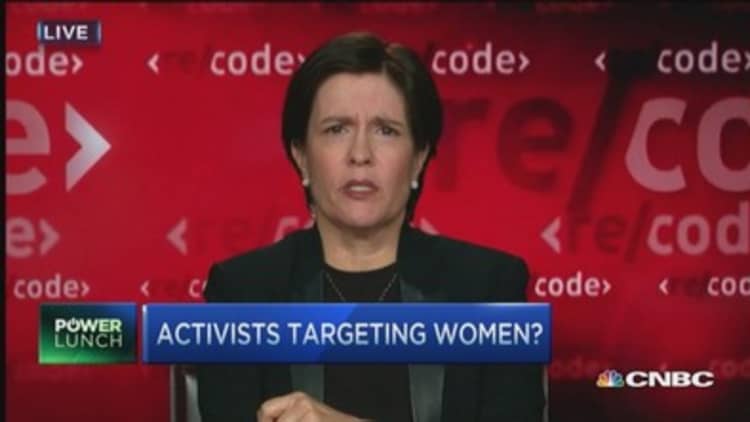
If activist investors are picking on women CEOs, they might want to look elsewhere to start a fight.
Turns out that the few women actually in charge of companies are easily outperforming their male counterparts, according to an analysis from Bespoke Investment Group.
Bespoke's Paul Hickey decided to compare the two groups after seeing this column from Andrew Ross Sorkin, the New York Times' DealBook editor at large and co-host of CNBC's "Squawk Box." In the piece, Sorkin cites the travails of Indra K. Nooyi (PepsiCo), Marissa Mayer (Yahoo), Ellen Kullman (DuPont), Meg Whitman (Hewlett-Packard) and Mary Barra (GM). They each have had to withstand challenges from activists in recent months.
Checking performance of women as a group showed that their companies have posted an average 19.5 percent stock gain over the past year, compared to 14.9 percent in companies that men run. Of course, the sample size is, to say the least, limited—just 24 companies in the index are run by women, with the other 476 by men—but still can be instructive.
Consider also that three of the top 25 companies in the Russell 3000 small- and mid-cap combined index were companies run by women. Conversely, none of the companies in the bottom 25 were female-helmed.
High-flying women CEOs
| Company | Ticker | CEO | 1-year price change |
|---|---|---|---|
| OvaScience | OVAS | Michelle Dipp | 373.60% |
| Build-a-Beaer | BBW | Sharon Price John | 135.80% |
| Cempra | CEMP | P.B. Fernandes | 127.50% |
| Frontier | FTR | Mary Wilderotter | 84.10% |
| Reynolds | RAI | Susan Cameron | 42.30% |
Source: Bespoke Investment Management
From an investing perspective, Hickey notes that women-led companies traded at an average 18.1 percent discount to their peers.
That statistic actually could be the reason why female CEOs find themselves the target of value-hunting activists.
"With consistently lower valuations than their peers, it is hard to overlook the glaring fact that even after at least a year of outperformance, companies with female CEOs are considerably cheaper than their male-run peers," Hickey said in the report.
"While the recent rise of activism in companies with female CEOs has been interpreted as activist investors 'having a problem with women,' or having a subconscious gender bias, the fact that the companies are undervalued also has something to do with it."






